In the last 2 years we have all been hearing about the new kid on the block, its not a kid though 😉 that’s set to transform how transactions take place. There has been numerous use cases submitted, some of which seem futuristic whereas some are already operational viz BlockID by 1Kosmos is revolutionizing Identity Management via the BlockChain (Read more about it on https://onekosmos.com/ )
Here we are going to explore the possibilities that Blockchain Technology can bring to transform the Pharma Industry particularly in the Indian sector but it has the potential to be applied globally.
Current Problems Plaguing the Pharma Industry
- Lack of transparency and proper coordination.
- There is a global, large scale operation of counterfeit drugs damaging the reputation of pharmaceutical companies and endangering the lives of patients.
- Larger companies have accepted the fact that percentage of their shipments get lost, without further investigation.
- Tracking of products is becoming more complicated, especially because of the need for availability of raw materials for the production and distribution of a final product.
- Another problem area that requires improvement is the coordination of the entire logistical body, which is in need of more space for positive innovation, due to issues like different software solutions, timezones and professional capabilities, complicating the establishment of a functioning, well-oiled corporate machine.
There has been some recent worrying news for the Indian Pharma Industry, viz:
- Over the course of 2015, nearly a third of the warning letters issued by the FDA’s Center for Drug Evaluation and Research (CDER) were tied to violations of safe manufacturing practices in India-based facilities. Charged with ensuring drug safety, CDER sent a total of 12 manufacturing-related warnings to 11 different companies with facilities located in India.
- Most of the manufacturing facilities in India struggled to maintain proper documentation of testing and sample data. Relatedly, at least nine facilities did not have appropriate controls in place to ensure electronic records and data were not manipulated. Others fell short in following up on out-of-specification results or complaints.
- Some of the largest drug suppliers in India, including Sun Pharma, Dr. Reddy’s, and Cadila, were flagged for issues ranging from mishandling of key trial data to unsanitary conditions. CDER also reported violations at the Indian facilities of other global drug manufacturers like Novarti’s Sandoz unit or Canada-based Apotex. The Indian firm Cadila received two warnings over the course of the year related to issues in two different locations.
How Blockchain can help transform the Pharma Industry?
The key areas where Blockchain has the potential to transform are:
- CLINICAL TRIALS – How trials are conducted.
- DRUG MANUFACTURING & SAFETY – Strengthening Manufacturing Process Control
- DRUG SUPPLY CHANNELS – How drugs move from manufacturer to end consumer.
- SUPPLY CHAIN INTEGRITY – Dynamic Fraud Detection of Counterfeit drugs
- PUBLIC SAFETY – Addressing end-consumer issues with drugs.
CLINICAL TRIALS – Improving data transparency using blockchain smart contracts
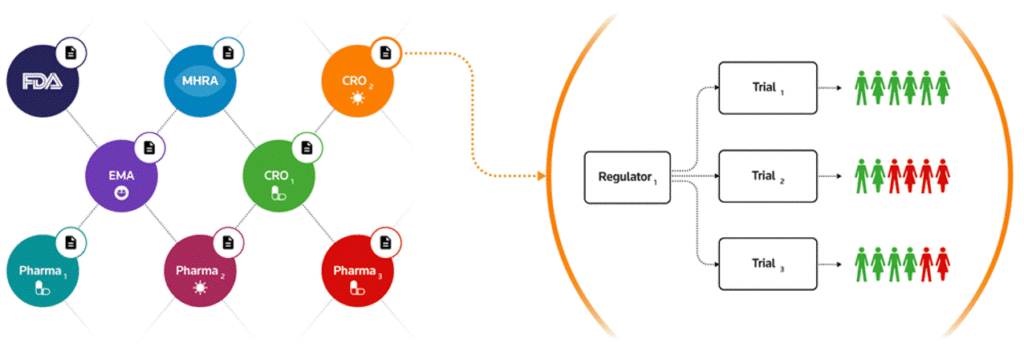
A private blockchain network consisting of regulators, pharma and contract research organisations can ensure transparency and authenticity of clinical trial data.
The system is composed of a hierarchical arrangement of two core types of smart contract – regulator contracts and trial contracts – with subjects and their associated clinical measurements appended to a container within the trial contract. The logic within the trial contract effectively enforces aspects of the trial protocol, ensuring that neither subjects nor measurements are appended outside of the predetermined trial timelines, while the tamper resistant characteristics of the blockchain prevent data manipulation.
DRUG MANUFACTURING & SAFETY
- The traceability of active pharmaceutical ingredients during the manufacturing process is difficult.
- Detecting drugs that, by error, do not contain the intended active ingredients they are meant to can lead to patient harm.
- Manufacturing involves several stages like Weighting and Dispensing, Mixing and Blending, Granulation, Compression, Coating, etc. The scale of manufacturing and shipment destination influence the process parameters as well. Manufacturing process control is an area of continued concern. Blockchain can be used to record the parameters and help build auditable trail with automated decisions.
- Blockchain’s immutability and provenance capability provides the basis for traceability of drugs from manufacture to end consumer, identifying where the supply chain breaks down.
Supply Chain Management & Drug Traceability
- Blockchain technology provides solutions that could be strongly beneficial in the Supply Chain Management.
- Companies will be able to speed up development, testing and distribution of drugs.
- The blockchain allows supply chain management to be much more flexible, transparent and secure, without affecting the most fundamental processes.
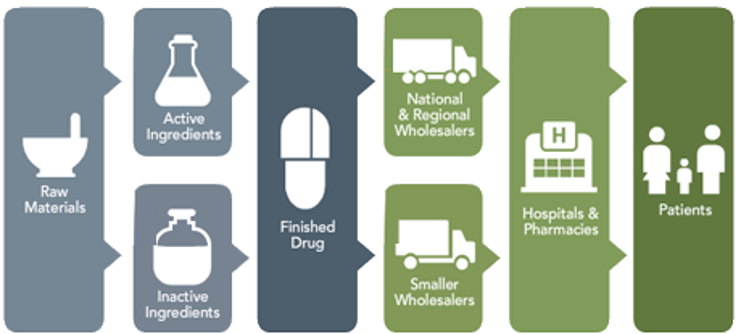
Advantages at a glance:
All transactions, from the sourcing of the product to the actual sale can be transparently documented and stored without the possibility of ex-post information tampering. Once a transaction was initiated, it is stored on the blockchain and is unchangeable. As a result, a company would be able to prevent human error, logistical delays and costs.
Blockchain for Drug Traceability:
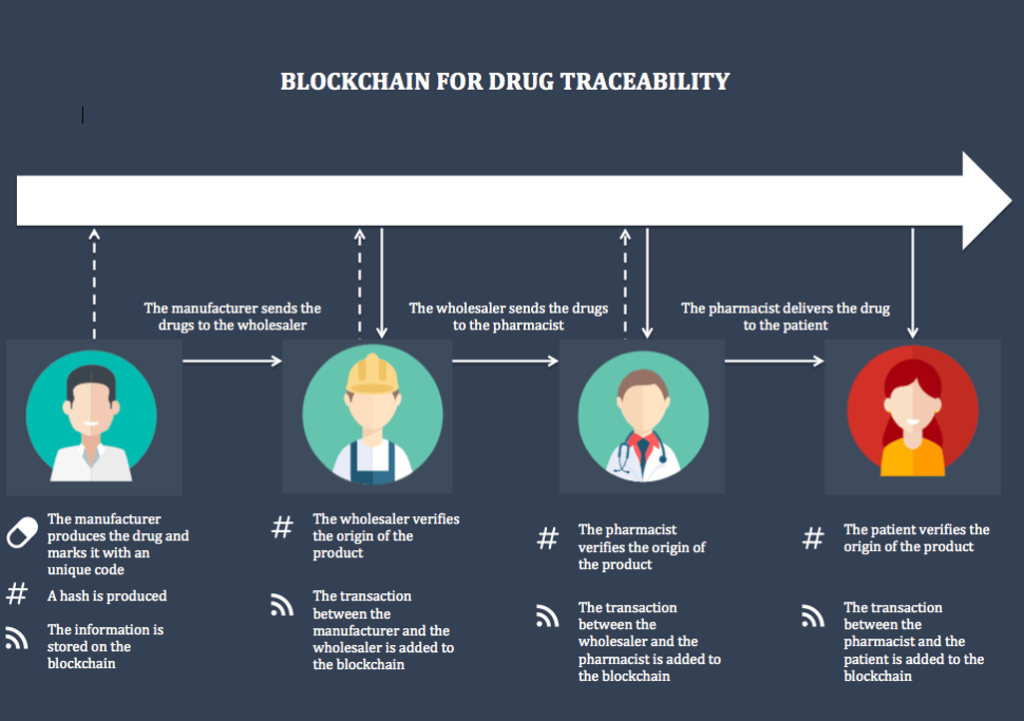
SUPPLY CHAIN INTEGRITY – Counterfeit Product Detection
| SOLUTION | BENEFITS |
| To proactively identify counterfeit, gray-market, and substandard products in the supply chain, records of all transactions will be maintained in the immutable blockchain ledger. This results in the creation of an encrypted, tamperproof, and non-repudiatable chain-of-custody log. A front-end system can send alerts whenever any party ships more of a product than it legitimately owns. If Vendor A purchases 10 units of product, he can only sell 10 units of product before the system sends out an alert. As soon as he sells more than 10 units, the system issue an alert. | The solution offers industry the following benefits: 1. It can provide real-time disclosure of the entire product path both up or down the supply chain. 2. Dynamic Detection technology proactively discovers suspicious transactions, alerting the regulatory bodies when the transaction occurs. (This may be weeks before a public-health incident occurs.) 3. All data are encrypted before being added to the system to keep data safe from prying eyes. 4. The solution architecture limits access to the data themselves. The only access is through pre-formulated queries that generate results in pre-formatted reports. |
PUBLIC SAFETY
Among the public safety issues that Blockchain technology might impact are:
- Recall management, where one million people are killed each year worldwide from counterfeit drugs. Better tracking through the supply chain has significant effect at the human level.
- Prescription drug abuse, which is often made possible by disconnected healthcare records across hospitals, walk-in clinics, doctors and pharmacies.
To sum up BlockChain can help in:
- Restoring integrity through security, trust and transparency on the supply chain
- Optimizing the process of delivering drugs to patients faster and more efficiently
- Providing true visibility into inventory management to anticipate drug shortages
- Better management of drug recalls and reducing patient exposure
- Increasing patient prescription adherence rates
- Gradually evolving into a patient-centric supply chain in line with the progression towards personalized medicine
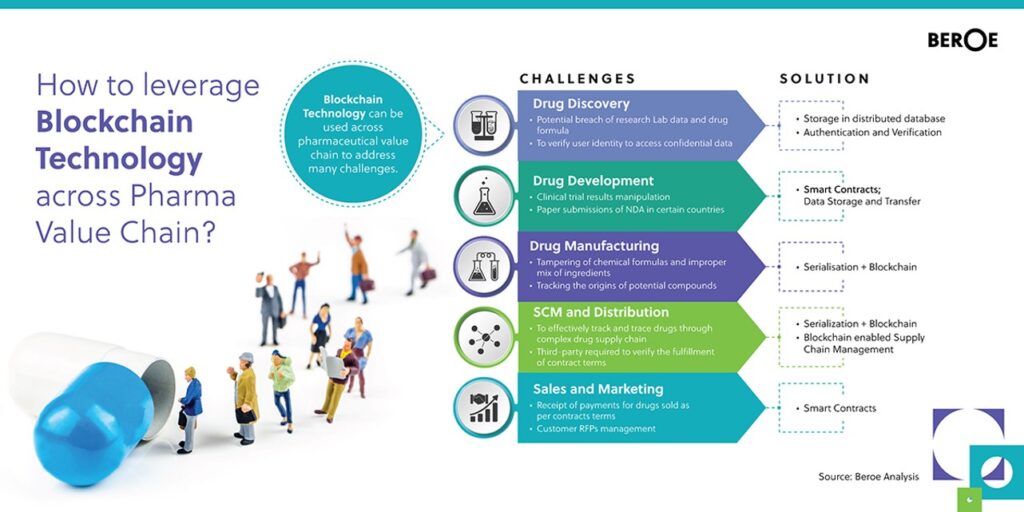
Future Areas of Implementation
Using IoT enabled smart devices to record data in a blockchain
Tracking Distribution Chain Integrity
Pharmaceutical products – particularly biological – are highly temperature sensitive. For instance, a vaccine may be allowed to be >25C only for 15min. It is essential to track temperature across shipment, warehouse, and dispensing. IoT-enabled temperature loggers can transmit the temperature excursion to a blockchain; SmartContracts on blockchain can automatically determine the stability of the pharmaceutical product and flag alerts when it is violated.
Preventive Maintenance of Medical Devices
While the IoT can help connect things, Blockchains can make the medical devices a lot smarter. Consider a surgical medical device whose operational data is fed to a blockchain. Medical Devices enterprises can create SmartContracts on blockchain to understand device health and automatically trigger a preventive maintenance.
Wearable Medical Devices
With IoT and Machine Learning a blockchain based SmartContracts can read patient vitals via an IoT powered continuous glucose monitor and feed to a machine learning algorithm for likely diagnosis.
Clinical Trials – Future Blockchain Use Cases
Patient Data Management – Future Blockchain Use Cases
Patient Data Management – Future Blockchain Use Cases
One of the main advantages of this technology, is that it allows the patient to control the access he gives to his medical records. The patient defines through a smart contract the condition on which his data can be accessed on the blockchain. In fact, all this will be done through an API and the patient will set the conditions on his profile.
When the patient is conscious: the combination of the patient’s and the provider’s private keys unlocks the access to the data. If the patient isn’t conscious: one or more third parties, picked by the patient, need to give their permission before the healthcare provider accesses the data. Either way, the patient has full control over his medical information and can decide whom to share it with.
Furthermore, medical records are not the only source of data related to a patient. Indeed, as IoT develops, wearables become an important souce of information. This type of data could be used in the patient’s interest to track his activity, set goals and adapt treatments. All this can be done through smart contracts. Indeed, the patient and his GP can define the clauses of the contract and set objectives and consequences if the patient succeeds or fails to reach them. The patient’s wearables record information and compare it to the clauses of the smart contracts in order to produce an action (reward or penalty). Moreover, the data is also sent to the GP, that can interact with the patient, see what were the main difficulties in reaching the objective, and therefore adapt the care.

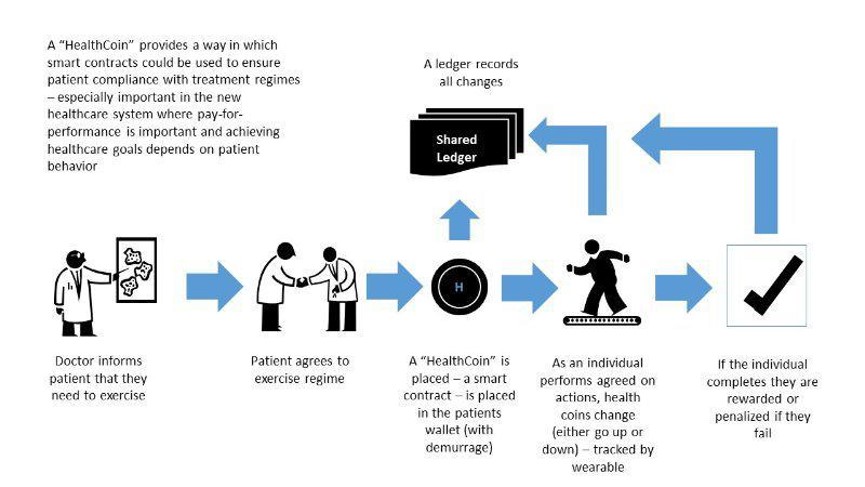
CONCLUSION
While no one would recommend moving to blockchain overnight, it’s essential to begin experimenting now by funding targeted proofs of concept to explore where and how blockchain thinking and technology could deliver transformative benefits.




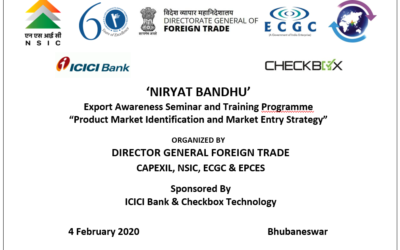
0 Comments